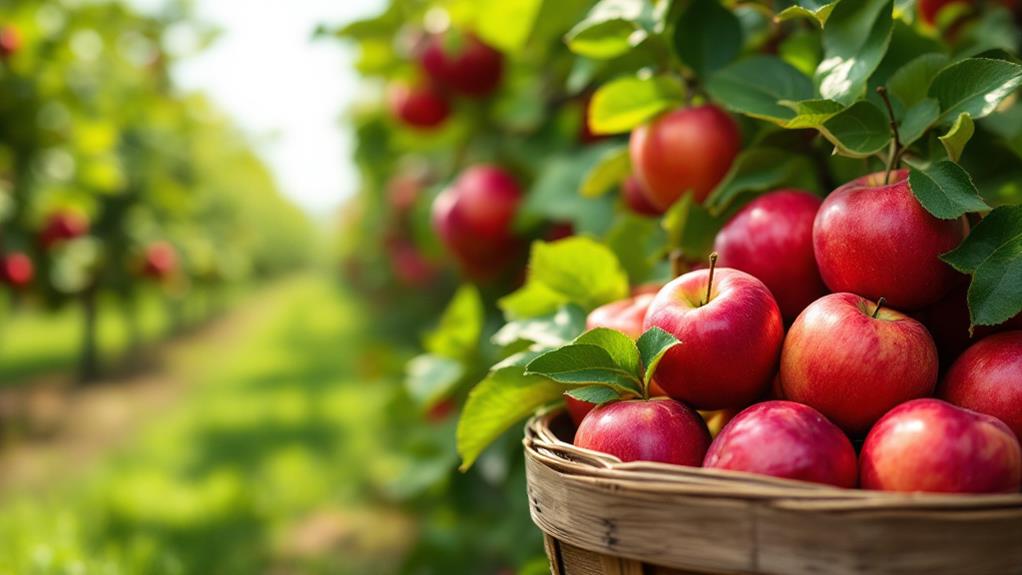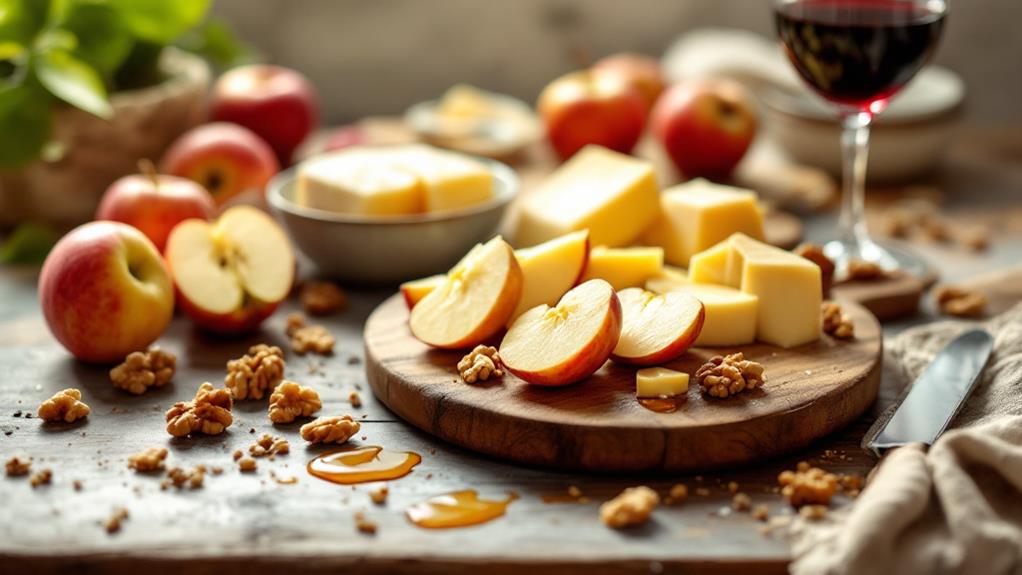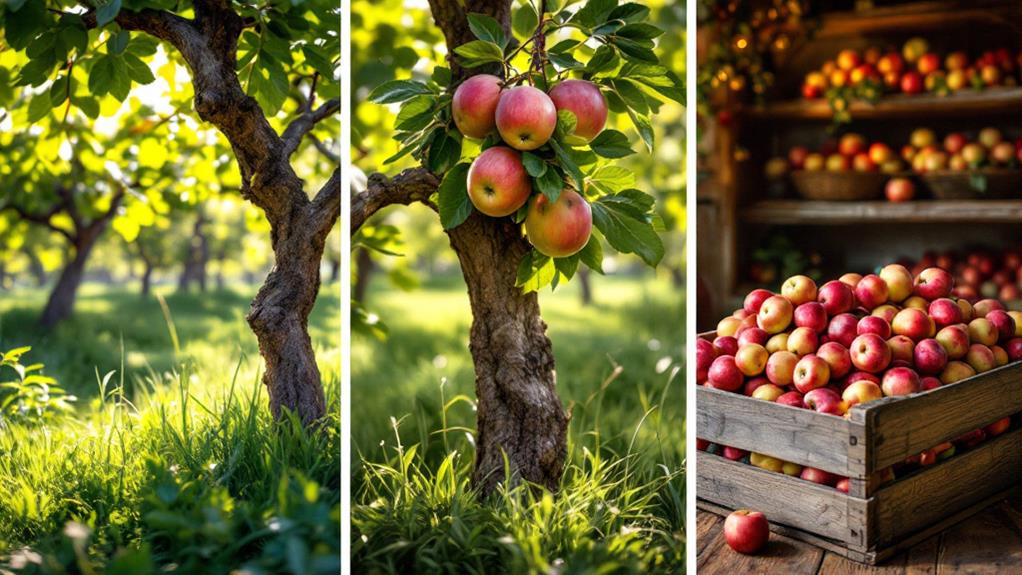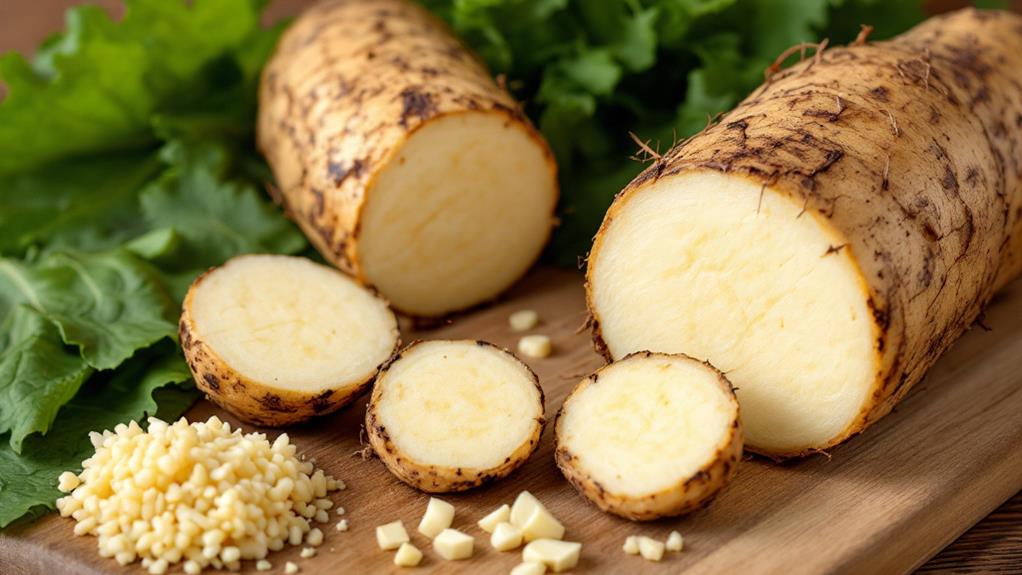Everything You Need to Know About Winesap Apples: History and Benefits

You'll find that Winesap apples hold a storied past, originating in 18th-century New Jersey and famously grown by Thomas Jefferson. These heirloom apples boast a sweet-tart flavor with wine-like nuances, perfect for snacking or cider making. Their glossy, red skin and crisp texture make them a staple in baking or salads. Nutrition-wise, they're packed with vitamin C, fiber, and antioxidants, promoting heart health and digestion. Winesaps pair excellently with sharp cheeses, enhancing any cheese platter. Their ability to store well only adds to their appeal. There's so much more to uncover about these historical gems.
Historical Significance of Winesap Apples
The Winesap apple boasts a rich history that stretches back to early 18th-century New Jersey, where it gained a reputation for its distinctive wine-like flavor and tangy zest. As an heirloom apple, it holds significant value in American agricultural history. During the 19th century, Winesap apples were a staple in Virginia orchards, playing an essential role for early settlers and farmers. They were cherished not only for their unique taste but also for their culinary versatility. You could find them in everything from baked goods to ciders, making them a favorite among regional cuisines.
Thomas Jefferson was among the notable figures who recognized the importance of Winesap apples. He cultivated them at Monticello, underscoring their historical significance and connection to American heritage. However, despite their popularity, the 20th century saw a decline in commercial production. Yet, these apples remain celebrated for their storability and enduring flavor, which continues to captivate those interested in heirloom varieties. As you investigate the rich past of Winesap apples, you'll see how their legacy lives on, inspiring efforts to preserve and celebrate this iconic piece of American agricultural history.
Unique Characteristics and Flavor Profile
With its glossy, thick skin ranging from bright to dark red, a Winesap apple catches the eye with its striking appearance. This visually appealing apple, with a yellow-green base and crimson striping, isn't just about looks. Bite into a Winesap, and you'll experience a robust flavor that sets it apart from other apple varieties. Its dense, crisp texture complements a unique taste that blends a sweet-tart flavor with wine-like nuances, making it a favorite among apple enthusiasts.
The firm and juicy flesh of Winesap apples makes them an ideal choice for both fresh snacking and culinary creations. Their sweet and fruity aroma, accented by subtle spice-like notes, improves this apple's complete flavor profile, offering a sensory delight that's hard to resist. What truly stands out is the balance of acidity and sweetness, which contributes to its popularity in cider making and holiday baking.
Whether you're a fan of traditional apple varieties or exploring new flavors, the Winesap offers a distinctive experience. Its combination of sweet-tart flavors and crisp texture guarantees that each bite is both invigorating and satisfying, making it a must-try for any apple lover.
Culinary Uses and Pairings

Among the many pleasures of the Winesap apple is its versatility in the kitchen. With a firm texture and balanced sweet-tart flavor, it's a perfect choice for baking, especially in dishes like apple pie and crisps. You'll find that Winesap apples hold up beautifully during cooking, offering a distinct flavor that boosts your creations. If you're into fresh eating and culinary adventures, their crisp and juicy flesh makes them a delightful inclusion to salads and fruit bowls, adding a revitalizing twist to your meals.
When it comes to pairings, Winesap apples shine alongside sharp cheeses like cheddar and gouda. Their tartness complements these cheeses, making them an ideal choice for cheese platters and charcuterie boards. If you're looking to experiment, try incorporating Winesap apples into sauces, jams, or desserts. Their natural acidity pairs well with spices like cinnamon and nutmeg, creating rich, flavorful dishes.
Winesap apples aren't just for solid foods; they're also celebrated in the domain of beverages. Their contribution to apple cider is significant, providing a tangy, fruity profile that improves the drink's character. For more on Winesap FAQ, investigate how these versatile apples can also support your immune system.
Nutritional Benefits
A multitude of benefits awaits those who include Winesap apples in their diet. These apples are packed with vitamin C, a powerful ally in supporting your immune system function. By fortifying your body's defenses, vitamin C helps protect you against common illnesses. Winesap apples also boast a good amount of dietary fiber, which promotes digestive health. The fiber content not only aids in keeping your digestive system running smoothly but also helps with weight management by making you feel fuller for longer.
In conjunction with fiber and vitamin C, Winesap apples are loaded with antioxidants like quercetin. These compounds can help reduce inflammation and support heart health by improving circulation and reducing the risk of chronic diseases. Your heart will thank you for including these apples in your diet!
Winesap apples also provide a dose of fundamental minerals, including potassium and calcium, along with trace minerals such as boron and zinc. These nutrients contribute to diverse bodily functions, ensuring you maintain peak health. Plus, with added benefits from vitamins A and E, Winesap apples help protect your cells and support healthy organ function. They're a delicious and nutritious enhancement to any healthy lifestyle.
Growing and Storage Tips

Regarding growing Winesap apples, you'll want to make certain the trees receive proper care to thrive. Winesap apple trees typically start bearing fruit within 4 to 6 years and are well-suited for hardiness zones 5 to 8, accommodating a range of climates. To guarantee peak fruit production, focus on pest management and regular pruning. These practices help the trees grow strong, healthy, and productive. Adequate pollination is also essential, so consider planting compatible pollinator varieties nearby to enhance fruit yield.
When it comes to storage, keeping your Winesap apples fresh is straightforward. Store them in a cool, dry environment to preserve their flavor and texture for at least three months. For those looking to enjoy Winesap apples beyond this period, effective preservation methods like canning, making apple butter, or drying are excellent options. These methods allow you to savor their distinct taste year-round.
If you're storing cut apples, dip them in a mixture of water and lemon juice. This simple trick helps prevent browning and maintain freshness. By following these growing and storage tips, you'll enjoy delicious Winesap apples at their best.




